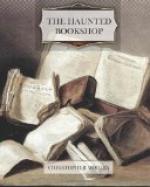“I will tell you another reason why I don’t advertise,” he continued. “In these days when everyone keeps his trademark before the public, as you call it, not to advertise is the most original and startling thing one can do to attract attention. It was the fact that I do not advertise that drew you here. And everyone who comes here thinks he has discovered the place himself. He goes and tells his friends about the book asylum run by a crank and a lunatic, and they come here in turn to see what it is like.”
“I should like to come here again myself and browse about,” said the advertising agent. “I should like to have you prescribe for me.”
“The first thing needed is to acquire a sense of pity. The world has been printing books for 450 years, and yet gunpowder still has a wider circulation. Never mind! Printer’s ink is the greater explosive: it will win. Yes, I have a few of the good books here. There are only about 30,000 really important books in the world. I suppose about 5,000 of them were written in the English language, and 5,000 more have been translated.”
“You are open in the evenings?”
“Until ten o’clock. A great many of my best customers are those who are at work all day and can only visit bookshops at night. The real book-lovers, you know, are generally among the humbler classes. A man who is impassioned with books has little time or patience to grow rich by concocting schemes for cozening his fellows.”
The little bookseller’s bald pate shone in the light of the bulb hanging over the wrapping table. His eyes were bright and earnest, his short red beard bristled like wire. He wore a ragged brown Norfolk jacket from which two buttons were missing.
A bit of a fanatic himself, thought the customer, but a very entertaining one. “Well, sir,” he said, “I am ever so grateful to you. I’ll come again. Good-night.” And he started down the aisle for the door.
As he neared the front of the shop, Mr. Mifflin switched on a cluster of lights that hung high up, and the young man found himself beside a large bulletin board covered with clippings, announcements, circulars, and little notices written on cards in a small neat script. The following caught his eye:
RX
If your mind needs phosphorus, try “Trivia,” by Logan Pearsall Smith.
If your mind needs a whiff of strong air, blue and cleansing, from hilltops and primrose valleys, try “The Story of My Heart,” by Richard Jefferies.
If your mind needs a tonic of iron and wine, and a thorough rough-and-tumbling, try Samuel Butler’s “Notebooks” or “The Man Who Was Thursday,” by Chesterton.
If you need “all manner of Irish,” and a relapse into irresponsible freakishness, try “The Demi-Gods,” by James Stephens. It is a better book than one deserves or expects.
It’s a good thing to turn your mind upside down now and then, like an hour-glass, to let the particles run the other way.




